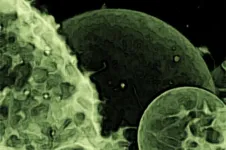(Press-News.org) Brain organoids, though often referred to as “mini brains,” are not truly human brains. But the concerns over these lab-grown brain tissues, especially when they are developed from human fetal tissues, can be very human indeed.
Researchers from the Graduate School of Humanities and Social Sciences at Hiroshima University offer valuable insights into the complexities inherent in brain organoid research, making significant contributions to the ongoing discourse surrounding this innovative biotechnology and paving the way for informed decision-making and legal and ethical stewardship in the pursuit of scientific advancement.
Their paper was published on March 4 in EMBO Reports.
Brain organoids are three-dimensional human brain tissues derived from stem cells, which are capable of developing into many different cell types. They replicate the complexity of the human brain in a laboratory setting, allowing researchers to study brain development and diseases in the hopes of acquiring vital insights and making innovative medical advancements.
Traditionally, brain organoids are grown from pluripotent stem cells, an especially potent sub-type that is typical of early embryonic development, but new technologies now make it possible to generate these organoids from human fetal brain cells. This method comes, however, with even more heated legal and ethical debates about brain organoids — debates that are already intense in conventional organoid research.
“Our research seeks to illuminate previously often-overlooked ethical dilemmas and legal complexities that arise at the intersection of advanced organoid research and the use of fetal tissue, which is predominantly obtained through elective abortions,” said Tsutomu Sawai, an associate professor at Hiroshima University and lead author of the study.
The study highlights the urgent need for a sophisticated and globally harmonized regulatory framework tailored to navigate the complex ethical and legal landscape of fetal brain organoid (FeBO) research. The paper emphasizes the importance of informed consent protocols, ethical considerations surrounding organoid consciousness, transplantation of organoids into animals, integration with computational systems, and broader debates related to embryo research and the ethics of abortion.
“Our plan is to vigorously advocate for the development of thorough ethical and regulatory frameworks for brain organoid research, including FeBO research, at both national and international levels,” said Masanori Kataoka, a fellow researcher at Hiroshima University.
“Rather than being limited to issues of consciousness, it’s imperative, now more than ever, to systematically advance the ethical and regulatory discussion in order to responsibly and ethically advance scientific and medical progress,” Sawai said.
Moving forward, the research duo plans to continue supporting the advancement of ethical and regulatory discussions surrounding brain organoid research. By promoting responsible and ethical progress in science and medicine, they aim to ensure that all research involving brain organoids, including FeBOs, is conducted within a framework that prioritizes human dignity and ethical integrity.
###
About Hiroshima University
Since its foundation in 1949, Hiroshima University has striven to become one of the most prominent and comprehensive universities in Japan for the promotion and development of scholarship and education. Consisting of 12 schools for undergraduate level and 4 graduate schools, ranging from natural sciences to humanities and social sciences, the university has grown into one of the most distinguished comprehensive research universities in Japan. English website: https://www.hiroshima-u.ac.jp/en
END
Are lab-grown brain tissues ethical? There is no no-brainer answer
Insights into ethical and legal ramifications of growing brain organoids from human fetal brain tissue
2024-04-09
ELSE PRESS RELEASES FROM THIS DATE:
Tiny brain bubbles carry complete codes
2024-04-09
In findings published in Cell Reports, senior author Jerold Chun, M.D., Ph.D., and team also discovered that the biological instructions within these vesicles differed significantly in postmortem brain samples donated from patients suffering from Alzheimer’s disease.
Researchers call the tiny brain bubbles under scrutiny in this study small extracellular vesicles (sEVs). These tiny biological water balloons are produced by most cells in the body to ferry a wide variety of proteins, lipids and byproducts of cellular metabolism, as well as RNA nucleic acid codes used by recipient cells to construct new proteins.
Because this biologically active cargo can easily elicit changes in other ...
The American Society of Plant Biologists names 2024 award recipients
2024-04-09
The American Society of Plant Biologists (ASPB) is pleased to announce the recipients of its 2024 awards, which honor distinction in service, outreach, education, and research.
ASPB-Carnegie Winslow Briggs Mentorship Award
Judy Brusslan, California State University, Long Beach, CA
Joanne Chory, The Salk Institute for Biological Studies, La Jolla, CA
Charles Albert Shull Award
Robert Schmitz, University of Georgia, Athens, GA
Charles Reid Barnes Life Membership Award
Julia Bailey-Serres, University of California, Riverside, ...
Early medieval money mystery solved
2024-04-09
University of Cambridge media release
Early medieval money mystery solved
UNDER STRICT EMBARGO UNTIL 00:01 AM (UK TIME) ON TUESDAY 9TH APRIL 2024
Byzantine bullion fuelled Europe’s revolutionary adoption of silver coins in the mid-7th century, only to be overtaken by silver from a mine in Charlemagne’s Francia a century later, new tests reveal. The findings could transform our understanding of Europe’s economic and political development.
Between 660 and 750 AD, Anglo-Saxon England witnessed a profound revival in trade involving a dramatic ...
Dr. Himabindu Vidula is new chair of ACC Board of Governors
2024-04-09
Effective today, Himabindu Vidula, MD, MS, FACC, will serve as chair of the American College of Cardiology Board of Governors (BOG) and secretary of the Board of Trustees. Her term will run one year from 2024-2025.
Vidula will lead governors from chapters representing all 50 states, the District of Columbia, Puerto Rico, Canada, Mexico and representatives from the U.S. health services. The BOG serves as the grassroots governing body of the ACC, a leading cardiovascular organization representing over 56,000 cardiovascular care team members around the world.
“As ...
Texas A&M AgriLife Research, Charm Therapeutics receive new support to tackle high-value tuberculosis targets
2024-04-09
MEDIA INQUIRES
WRITTEN BY
Laura Muntean
Gabe Saldana
laura.muntean@ag.tamu.edu
gabe.saldana@ag.tamu.edu
601-248-1891
A ...
Cardiology team performs novel heart artery repair with newly approved device
2024-04-09
UC Davis Health cardiology team members are among the first in the country to treat patients with tricuspid regurgitation, or a leaky heart valve, by using a groundbreaking catheter.
The minimally invasive procedure, a transcatheter edge-to-edge repair (TEER), is made possible with a new medical device called the Abbott TriClip™ system.
UC Davis Medical Center is one of the first sites nationwide to have commercial access to TriClip and is the first hospital in Western United States to utilize the system since it was approved by the U.S. Food and Drug Administration (FDA) last week. UC Davis also hosted clinical trials for the procedure in 2023.
“We are excited to offer our ...
COVID-19 school and daycare closures left working mothers physically and mentally exhausted, study shows
2024-04-09
Home-schooling and caring for children during the COVID-19 school and daycare closures left many working mothers physically and mentally exhausted and with little or no time to switch off, a new study shows.
The experience left working women with children feeling stressed, guilty, and worried, researchers found.
Mothers often felt overly stressed trying to balance work and family responsibilities, guilty for not meeting their child’s needs, and were worried over their child’s well-being and academic progress and increasing work demands.
Most of those who took part in ...
The surprising connection between male infertility and family cancer risk
2024-04-09
In a recent study, researchers at Huntsman Cancer Institute at the University of Utah (the U) found a surprising trend in families with male infertility: an increased risk of certain cancers. This discovery could lead to a more personalized approach to cancer risk assessments, making cancer prevention more effective.
According to the National Institutes of Health, around 9% of men at reproductive age have experienced fertility problems.
“We know that men who experience infertility tend to have more health issues like cardiovascular disease, autoimmune conditions, earlier mortality, ...
Does cannabis use affect cognitive decline?
2024-04-08
A new study by Upstate Medical University researchers shows that recreational cannabis use may offer protection against cognitive decline.
The study, done by Master of Public Health (MPH) student Zhi Chen and Professor Roger Wong, Ph.D., MPH, MSW, analyzed a large data set from the CDC and found that compared to non-users, non-medical cannabis use, such as for recreational purposes, was significantly associated with 96 percent decreased odds of subjective cognitive decline (SCD). Medical and dual (medical and non-medical) use were also associated with ...
Heart disease, depression linked by inflammation: study
2024-04-08
Coronary artery disease and major depression may be genetically linked via inflammatory pathways to an increased risk for cardiomyopathy, a degenerative heart muscle disease, researchers at Vanderbilt University Medical Center and Massachusetts General Hospital have found.
Their report, published April 5 in the journal Nature Mental Health, suggests that drugs prescribed for coronary artery disease and depression, when used in combination, potentially may reduce inflammation and prevent the development of cardiomyopathy.
“This work suggests that chronic low-level inflammation may be a significant contributor to both depression ...
LAST 30 PRESS RELEASES:
Novel camel antimicrobial peptides show promise against drug-resistant bacteria
Scientists discover why we know when to stop scratching an itch
A hidden reason inner ear cells die – and what it means for preventing hearing loss
Researchers discover how tuberculosis bacteria use a “stealth” mechanism to evade the immune system
New microscopy technique lets scientists see cells in unprecedented detail and color
Sometimes less is more: Scientists rethink how to pack medicine into tiny delivery capsules
Scientists build low-cost microscope to study living cells in zero gravity
The Biophysical Journal names Denis V. Titov the 2025 Paper of the Year-Early Career Investigator awardee
Scientists show how your body senses cold—and why menthol feels cool
Scientists deliver new molecule for getting DNA into cells
Study reveals insights about brain regions linked to OCD, informing potential treatments
Does ocean saltiness influence El Niño?
2026 Young Investigators: ONR celebrates new talent tackling warfighter challenges
Genetics help explain who gets the ‘telltale tingle’ from music, art and literature
Many Americans misunderstand medical aid in dying laws
Researchers publish landmark infectious disease study in ‘Science’
New NSF award supports innovative role-playing game approach to strengthening research security in academia
Kumar named to ACMA Emerging Leaders Program for 2026
AI language models could transform aquatic environmental risk assessment
New isotope tools reveal hidden pathways reshaping the global nitrogen cycle
Study reveals how antibiotic structure controls removal from water using biochar
Why chronic pain lasts longer in women: Immune cells offer clues
Toxic exposure creates epigenetic disease risk over 20 generations
More time spent on social media linked to steroid use intentions among boys and men
New study suggests a “kick it while it’s down” approach to cancer treatment could improve cure rates
Milken Institute, Ann Theodore Foundation launch new grant to support clinical trial for potential sarcoidosis treatment
New strategies boost effectiveness of CAR-NK therapy against cancer
Study: Adolescent cannabis use linked to doubling risk of psychotic and bipolar disorders
Invisible harms: drug-related deaths spike after hurricanes and tropical storms
Adolescent cannabis use and risk of psychotic, bipolar, depressive, and anxiety disorders
[Press-News.org] Are lab-grown brain tissues ethical? There is no no-brainer answerInsights into ethical and legal ramifications of growing brain organoids from human fetal brain tissue





